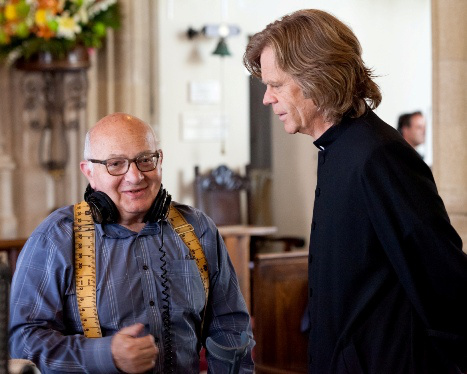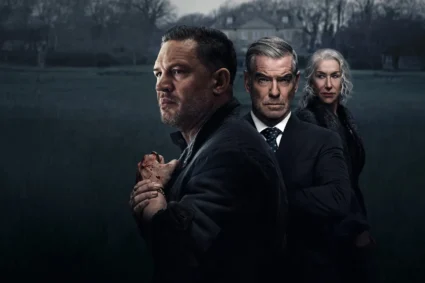
Mark O’Brien was a journalist and poet who had polio since his childhood. O’Brien used an iron lung for much of his life to help him breathe.At the tender age of 38, O’Brien decided to do this unthinkable, he hired a sex surrogate to help him experience sex for the very first time. His journey is chronicled in the upcoming movie, The Sessions. TRR reporter Dean Rogers had the opportunity to interview director Ben Lewin and actor John Hawkes to get their insights of this extraordinary film.
DR: How did you come across Mark O’Brien’s life story? It’s an amazing story and he lived an incredible life.
Ben Lewin – Director: I had no idea who he was when first came across his article. It was complete serendipity. I was surfing the internet for all the wrong reasons. In fact, I was set on doing a sitcom about myself, doing a project called “The Gimp” about a guy whose younger than me but very horny and given to trading the use of his handicap placard for sex. I was looking for tasteless material about sex and disability. I stumbled across Mark’s article on seeing a sex surrogate. It was really one of those kinds of burning bush moments. It really did affect me very powerfully. I was, at first, a little suspicious by my own responses. Then, I came around to the idea that this wasn’t just something that would appeal to people in iron lungs that there was universality about it. It spoke to everyone’s fear of sex in a way. That’s how it happened, pure accident. The way most things have happened to me.
DR: John Hawkes, what an amazing performance he did for your movie. How did you get him involved?
BL: I have to give credit to our casting director, Ronnie Yeskel, who called me as soon as he’s got his Oscar nomination. I immediately looked at Winter’s Bone and thought “Wow, that creepy old guy” and wondered what else you have in mind. Then, I looked at the body of his work and realized he’s a real chameleon as an actor and that incredible diversity. When we met, I certainly realized that he’s not a creepy guy; he’s not spooky by nature. He was very warm and witty and we were exactly on the same page about this was going to be a “cripple of the week” movie. He also has the physical advantage of being scrawny. I was able to avoid the nightmare of using a body double, special effects and all of that. It’s a process committing yourself to a particular actor and the reverse. It was a real gift that it sort of fallen into my lap in a way. I can’t imagine anyone else, it’s strange.
DR:Well, I am glad you didn’t pick anyone else. How did you work with Hawkes and (Helen) Hunt develop the chemistry portrayed in the film?
BL: One of the essential ways was by not getting in the way. I tried to do all the work before you get on set. When you got the crew there, the equipment and everything you got so many hours to do it, this is not time to reinvent the movie it’s time to just execute the work you prepared. I didn’t intervene very much during the shooting to say “No, do it this way instead of that way.” I would really leave to them to judge whether we want to do something again, or whether we want to do it in a different way. Typically, we always just did things the one way. Sometimes, they would say let’s do it again for whatever reason. John is something of a perfectionist and will want to do it again until the cows come home. Sometimes, it’s a matter of me saying “John, we got it; we got it three takes ago.” I am not the sort of director who unless the actor wants to direct them in this kind of minute physical way. One of the exciting elements to me is not to know what’s going to happen and not to preplan that chemistry; to let it evolve rather than to pretend to go out and create it because you can’t create it. You have to live with what you get. The effort has to go into the casting to instinctively think that this chemistry is going to work.
DR: This was an emotionally powerful film. During the shooting, what was the one scene that was emotional to you?
BL: I think it was the scene where the two of them all of a sudden decided to end it because I could sense that when the played that scene, the crew was affected by it. You know that’s always a pretty good sign that that the emotion was working.
DR: I have to admit that I teared up at that scene
BL: You know none of us knew how they were going to play. It was not too much, I can’t quite describe it. It involves a lot of strength of restraint of any actor’s part to really capture the emotion without emoting.
Next, I interviewed Academy Award nominee John Hawkes, who played Mark O’Brien in the movie
DR: What was the moment, while portraying Mark; you understood what he went through?
John Hawkes: The role was physically demanding. Per the script, my own choice and watching Jessica Yu’s documentary, Breathing Lessons – a short documentary based on Mark’s life, I saw Mark’s twisted frame and the script speaks of his spine horribly curved several times. So, with the prop’s people help developed a piece of crude foam soccer sized ball with duct tape wrapped around it that I would stick halfway under my back to get Mark’s curve. Mark not only in the documentary do I see this but in his writing he would describe this in detail. His right hand turned palm to the sky, his left hand clawed and turned under, his feet kind of bode together and his head turned to the right with some kind of ball under my back to find that really contorted position to try to make that position second nature so that I wouldn’t think about.
I begin to feel like Mark but I guess I felt the most like mark probably between takes when I be lying there very still and people on the crew begin to set like pieces of clothing or drinks or their script or other things on top of me as though I was a piece of furniture. I was disappearing before people eyes and Mark has said he often felt invisible to able body people.
DR: Mark, as we saw in the film, balances humor with what he’s going through. Now as an actor, was it difficult to find the humor in all of this?
JH: No, it’s spelled out so wonderfully. I mean there are several things. The first line of the movie isn’t overtly funny but the first line that Ben wrote for Mark was “scratch with your mind.” I mean that kind of describes in a strange way the absurdity of life. It describes his mindset in a great way. He’s obviously got a lot of challenges. How do you scratch your nose with your mind but it’s also like scratching your mind in a weird way to simulate it and bring forth more of it. Just a line like when Susan at the end of the film something like “Are you religious?” He said “I would find it impossible to live without having to blame for all of this.” There’s a great clue into the character’s dark mind set. I relate to Mark’s humor somehow a great deal because I have a dose of sarcasm in me at times. Mark was very quick-witted and that’s very admirable. I like comedy. I hope I was able to tap into what the script had for me.
DR: In your twenty-five career as an actor and a writer, what’s the best piece of advice that you ever receive?
JH: I once read in a book that those who succeed in Hollywood, or I would think in any walk of life I would extrapolate to, aren’t the ones who never get knocked down because everyone gets knocked down. It’s the ones who get up, dust themselves off and take another step forward that succeed.
We would like to thank Ben Lewin & John Hawkes for their time. The Sessions opens in theatres this weekend from Fox Searchlight Pictures




